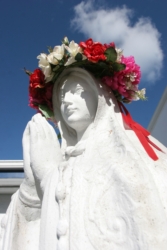Veneration and visitation
The Blessed Virgin Mary. Those words are capable of provoking just about every response imaginable. From affection to anger to apathy, just mentioning the Mother of Jesus seems to bring out the best as well as the not-so-best in us. The truth is that when it comes to Mary, we are all over the map. Some of us seem to teeter on the edge of idolatry with the honor they give her. Others of us, just don’t see why anyone would choose to go to Mary when they could go directly to her Son, Jesus. There are Catholics who would find it difficult to imagine their lives of faith without Mary, and equally sincere Catholics who find it a strain to incorporate Mary into their Christian discipleship much at all. It is a wonder that after 2,000 years, a poor little woman from Nazareth with next to no social status could still be a source of comfort and discomfort to us.
Most of us understand that devotion to Mary, whatever form it takes, is neither equal to the worship we owe God, nor to what we actually give Him. However, what we hear most often about Mary tends to focus on how she differs from the rest of us. Yet, Mary is a creature like us. She was and is human. Sometimes, it seems that making sense of her humanity is what is hardest for us to do. Our temptation is to put Mary on a pedestal just high enough to let us humbly excuse ourselves from living our faith the way she did. But even though she was set apart for a singular holiness with respect to salvation, the example of Mary’s life is one we all can--and should--follow.
Chosen to be the mother of the Son of God, Mary was given all that she needed to serve God’s will completely. Yet, the choice to serve Him remained free and remained hers. God does the very same for each of us. He prepares those good works we are called to walk in and, as St. Paul wrote to Timothy, fully equips us for them. God does not ask the impossible of us. Rather, He accomplishes the impossible in us, just as He did when a virgin conceived, and when her cousin too old to bear children, gave birth to John the Baptist.
Most of us can and do spend our spiritual lives navigating between heretical extremes. There are seasons in which we swing a little more this way than that, and sometimes lose our balance. But I think that ultimately, a person’s Mariology has very little to do with how he or she feels about the Mother of Christ. Like everything else in our Christian faith, it’s all about relationship. How we experience the Blessed Mother will naturally be colored by how we experienced our own mothers, both for good and for ill.
What the Church teaches about Mary is rich. But while the titles we may pray in the Loreto Litany can enlighten and instruct us about Mary, conceptual knowledge cannot establish a relationship between an individual soul and the Mother of God. Information can help us on the way to formation, but faith is more a matter of following a Person than it is a matter of following directions. And that, in the end, is what Mary teaches best of all. Simply put, Mary followed Christ Jesus. She placed herself at His disposal, not just for nine months, but for her lifetime--even more, for eternity.
Whether we are comfortable crowning her image or not, whether your rosary spends more time in the drawer or in your hands, Jesus offers everything He has--even His mother--to us. To meet her we need only ask for a visit. We need not run to the hill country to find her, or follow her exile into Egypt. We will find her wherever we find Christ Jesus, for her place is always at His side. Her greeting is meant to stir into flame of the same Holy Spirit we share, the Holy One who animates all we are and unites all God’s children in mystical communion with Him and one another.
Jaymie Stuart Wolfe is a wife and mother of eight children, and a disciple of the spirituality of St. Francis de Sales. She is an author, speaker, musician and serves as Faith Formation Coordinator at St. Maria Goretti Parish in Lynnfield.



















